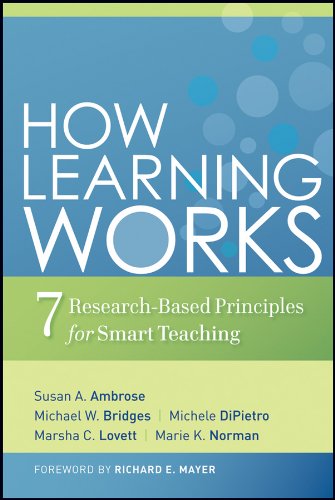Overview of “How Learning Works: Seven Research-Based Principles for Smart Teaching” Link to heading
Summary Link to heading
“How Learning Works: Seven Research-Based Principles for Smart Teaching” is a comprehensive guide that explores the underlying mechanisms of learning and provides instructors with actionable strategies for improving their teaching methods. The book is organized around seven key principles that are derived from extensive educational research. These principles offer a framework to understand how students learn and how educators can facilitate learning more effectively. The authors integrate practical strategies with theoretical insights, making it applicable to a wide range of educational contexts.
Review Link to heading
The book is widely praised for its clear and structured approach to demystifying the complexities of teaching and learning. The integration of research-based evidence with tangible teaching strategies is a significant strength, making the book both informative and practical. Some critics may argue that, while the principles are universally applicable, the implementation could vary significantly depending on individual teaching contexts, which may require further adaptation. However, overall, it is regarded as an essential resource for educators seeking to enhance their teaching effectiveness and student engagement.
Key Takeaways Link to heading
- Knowledge Organization: How students organize knowledge affects how they learn and apply what they know.
- Student Motivation: Understanding what motivates students can influence their engagement and learning outcomes.
- Mastery Development: Students need to develop component skills, practice integrating them, and know when to apply what they have learned.
- Practice and Feedback: Goal-directed practice coupled with targeted feedback enhances the quality of learning.
- Student Development: Being aware of and adapting to students’ prior knowledge, misconceptions, and developmental backgrounds improves learning experiences.
- Course Climate: A positive course climate can foster learning, while negative climates can hinder it.
- Self-Directed Learning: Encouraging students to become self-directed learners by promoting self-monitoring and self-assessment skills is crucial.
Recommendation Link to heading
This book is highly recommended for educators, instructional designers, and academic leaders who are looking to deepen their understanding of effective teaching strategies grounded in educational research. It is particularly beneficial for those interested in applying evidence-based practices to enhance student learning across different disciplines and educational levels. By implementing the principles outlined in the book, educators can foster a more engaging and effective learning environment.
